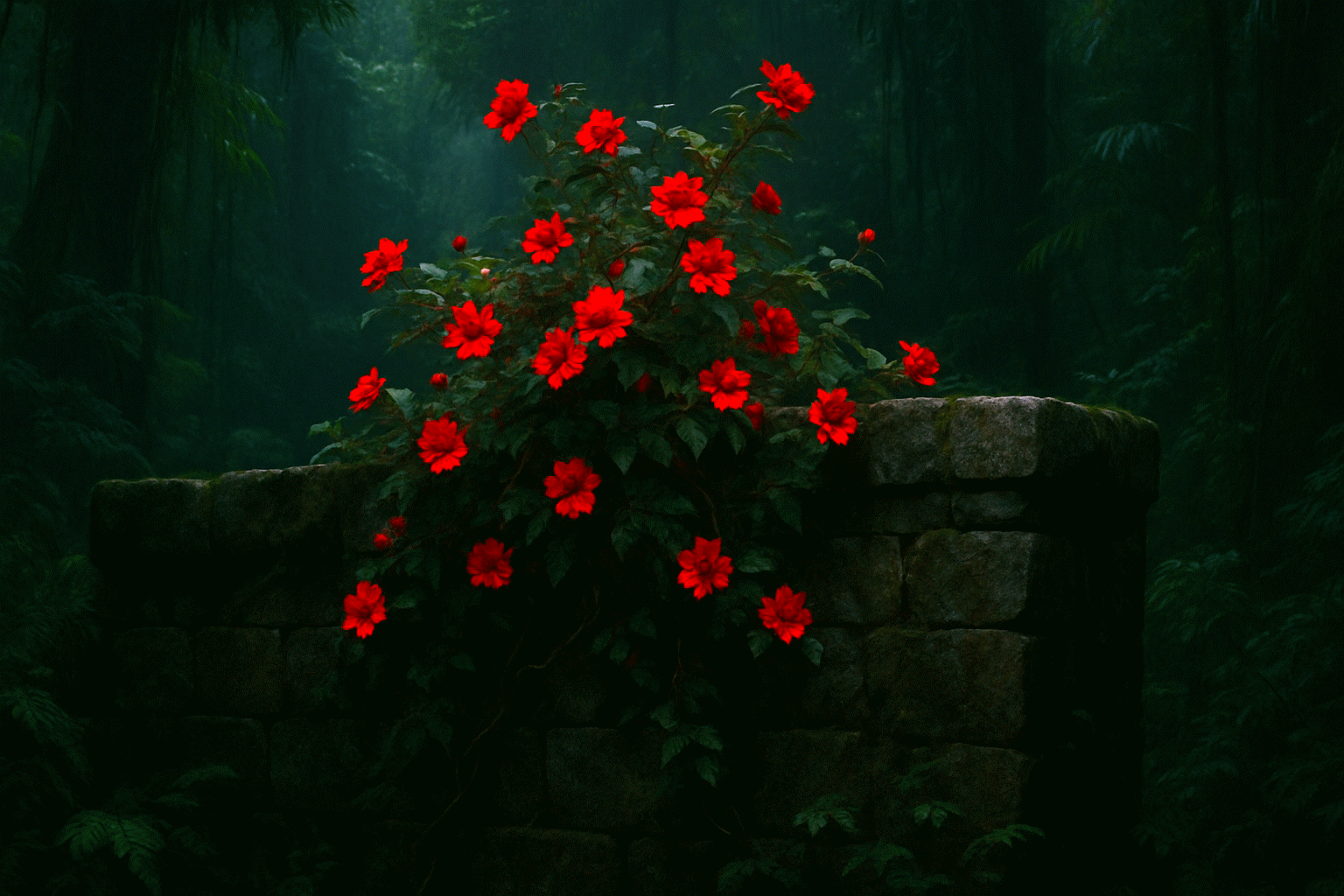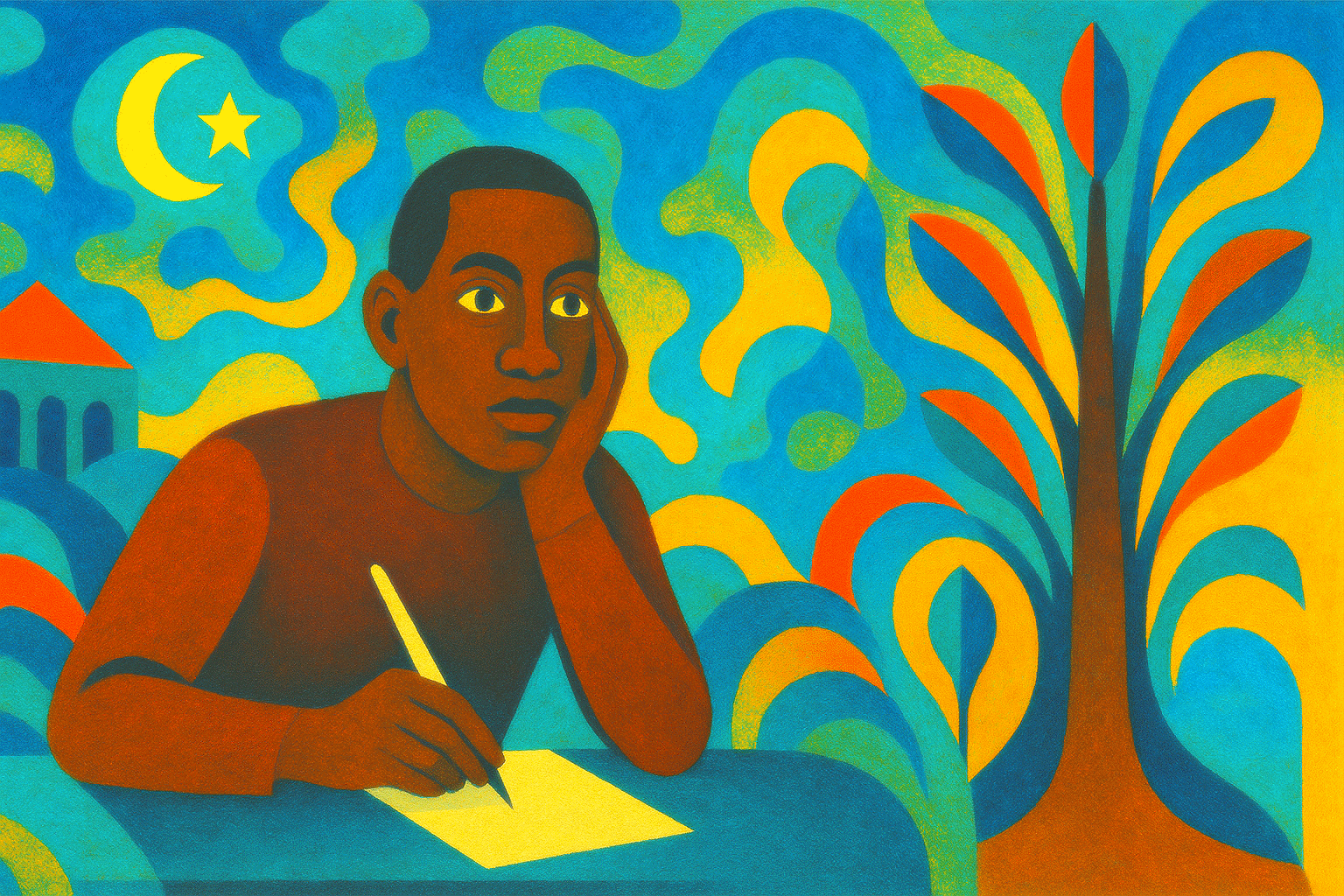“Looks like something is burning.”
Thiru glanced from the helicopter cockpit, towards Kampung Angus – the village where the man-eater attacks had been reported. He could see a thin column of smoke rising from a fire in the outskirts of the village.
“I can see a few people around the blaze,” said Thiru. “Maybe it’s a funeral?”
“The people in these villages do not cremate their dead,” replied Dr. Thangam. “I doubt it’s a funeral.”
“All right, we’ll find out soon, I can see the landing site,” said Thiru, “Please secure your seatbelts.”
Thiru felt such instructions were rarely necessary, when in low-altitude flight over Borneo. Flying over foaming rapids, dark ravines, and forbidding canopies struck a primal fear in most people. The tight embrace of a seatbelt was a comfort they needed, when facing nature looming vast and untamed.
Then again, thought Thiru, today’s passengers were different. His three passengers for the day were in the business of facing nature. Dr. Faizil and Dr. Thangam, a husband-wife duo of zoologists, and Lee Zheng, a forest ranger whose wiry physique contrasted with his grim expression and the deadly rifle at his side.
“Mr. Lee, things are already on fire down there. Your gun is ready, ah?” he asked.
“Mm,” grunted Lee Zheng.
“Thiru, don’t expect to hear much from Lee,” said Dr. Thangam. “I’ve met him three times, and have so far heard him say only two words.”
“Two words is okay, Doc,” replied Thiru, “as long as he has shot zero pilots.”
The zoologists laughed, and Thiru could have sworn even Lee Zheng let out a mildly amused grunt.
Pleased with himself, the pilot guided the helicopter down towards the landing site.
“All right, masters of beasts and bullets,” he said, “We have arrived at the site of mystery.”
—
Lee Zheng slid off his seat and onto the ground of the makeshift landing site. He let the cheerful pilot help the zoologists disembark, and stepped out of the shadow of the rotors to look at his field of operation.
Kampung Angus was a settlement filled with irregularly shaped houses scattered across uneven terrain. The village was set across the backdrop of a thick, sprawling rainforest. Greenery near settlements was common in the South East Asian tropics, but having viewed this land from flight, Lee felt that he was in a mere outpost of human civilisation smothered by the rainforest.
Lee had been tasked to remain posted within the confines of the village. His instincts, however, told him that it would not be long before he would be engulfed by the green light and shadows of the forest floor.
Two policemen in uniform walked up and introduced themselves as Constables Tawil and Hafiz. The constables guided them into a jeep and drove off towards the village.
“Thank you for coming to help us,” said Tawil, the older of the two constables, “it has been so distressing since the man-eater attacks started.”
“Why is only one of you armed?” snapped Hafiz, looking at Lee Zheng’s gun.
“Hafiz!” said Tawil.
Lee fixed his eyes on Hafiz, but the constable kept his gaze averted.
“What?” Hafiz barked at Tawil, “Animals have killed five of our villagers and the government just brings in a single gun?”
“Did you say five have been killed?” cried Dr. Faizil. “We were told there were only two deaths!”
Hafiz turned in his seat to glare at the scientist. Tawil nudged him with his elbow, and the younger constable grudgingly lowered his eyes.
“I am sorry,” said Hafiz, “I shouldn’t be angry at you. You are only doing your job, and have come to help us.”
“I understand your village is grieving a terrible tragedy,” said Lee Zheng. He delivered his words with a deep, soft voice moulded over years of experience – part of a persona that conveyed protection through lethal power. Hafiz turned toward him, a mixture of hope and undirected anger in his eyes.
“We will do our best to help,” Lee Zheng continued, “but it looks like our information is out of date. We were only told that a person had been killed by a tiger, and another by a leopard. When did the other three deaths occur?”
“There were two more attacks last night,” said Tawil. “The tiger struck again, breaking into old Aisha’s home – she lived alone on the edge of the village. We found her door smashed to pieces, and her floor covered in blood and tiger paw prints. Sulek was attacked by a pack of dogs who used to live here. The dogs would eat scraps, and be petted by our children. They attacked Sulek right in the middle of the village. They were chased away by people who woke up, but Sulek had lost too much blood and died a few hours later. And this morning … Fatima’s boy …”
Tawil’s voice choked up, and their jeep nearly swerved off the road before the old constable recovered and steadied himself.
Lee Zheng placed an arm on Tawil’s shoulder. For the two constables, the victims were not just cases to work on, but the people of their own village, friends, and possibly even family. These attacks were a horror unleashed on their very doorsteps. No wonder they wished they had received more armed support. But for now, Lee Zheng would have to do.
“What happened to Fatima’s boy?” asked Dr. Faizil.
Neither Tawil nor Hafiz found the words, merely pointing to the smoke they had seen from the helicopter. Wordlessly, they drove to the site of the village’s latest tragedy.
—
Fire, smoke, and the wailing of a grieving mother. Lee Zheng gritted his teeth as he took in the scene. They were in the outskirts of Kampung Angus. A white sheet had been pulled over a small figure on the ground, deep red stains signalling a gruesome end to a young life. A woman was next to the covered body, collapsed in a heap of tears and breathless screams.
Several paces away, closer to the edge of the forest, a small pyre had been lit, sending up the smoke that they had seen rising above the village.
“It was a monkey,” said Tawil, pointing at the smouldering pyre. “Fatimah was drying washed clothes in the morning, and her baby was sleeping inside. She saw a monkey enter the house through the open door. Thinking that it must have gone in to steal food, she looked around for a stick to chase it with. That’s when she heard her baby scream.” Tawil ran his hand over his face, and took a sharp breath. “She saw the monkey run out of the house, dragging the baby with it. Blood was streaming down from the child’s neck, and the monkey kept biting it repeatedly.”
“A monkey?” asked Lee Zheng. He looked at the zoologists. Dr. Thangam was staring at the covered corpse, her eyes glistening with tears. Next to her, her husband, Dr. Faizil stood with his hand across his mouth. Lee realised he could not expect the experts to explain what was happening. “What happened next?” he asked Tawil.
Tawil nodded slowly, turning to face the burning pyre. “Hafiz heard her screams, and ran to the spot. The monkey was scrambling right past him, and he blindly swung at it with his baton. That knocked the beast out. The child was also flung onto the ground, but the poor boy had lost so much blood …” Tawil’s voice choked, and he shook his head, lips pursed against the bitter memory.
“I hit the monkey again till I was sure it was dead,” said Hafiz.
“How can this be possible?” whimpered Dr. Faizil.
“It should not be possible,” Dr. Thangam responded. She had still not taken her eyes off the blood-stained bundle over which Fatimah was sobbing. “Monkeys may attack when they need protein,” she said with a flat, mechanical voice, “… but this forest is bountiful … and they don’t attack people … and this behaviour was observed across many species. No, none of this should be possible.”
The experts being at a loss was not what the village needed. Lee Zheng swung into action.
He grabbed his rifle’s strap, and swivelled the weapon in front of him. The constables stiffened instantly, eyes on the hunter, the situation awaiting his direction.
“How many more firearms do we have?” he asked them.
“Just my revolver,” said Tawil.
Lee Zheng nodded and turned to the zoologists. “Doctors, is there any line of investigation you can start?”
Dr. Thangam turned to him with a start. “Investigation? Dissection … maybe?”
“Yes, that is right,” said Dr. Faizil, “we can start a dissection of the monkey. See if there is anything we can observe from its physiology and prepare samples for the lab. Come Thangam, let’s get started.”
The zoologists slipped off their backpacks and began to ready their equipment for their task. That left…
“Thiru,” said Lee Zheng, facing the helicopter pilot, “please head back to the helicopter in the jeep. Send word over the radio that there have been more casualties, and we need reinforcements. At least four rangers with rifles.”
“Got it,” said Thiru. The pilot immediately hurried away, appearing relieved to be far from the macabre sight.
Now that Lee Zheng had ensured everyone was engaged productively, he paused to contemplate his next move.
“Tiger!”
The sharp cry was followed almost immediately by screams of terror.
“Everybody, get indoors now!” shouted Lee Zheng. “Get Fatimah inside,” he bellowed.
Women around Fatimah complied instantly, pulling away the distraught woman, and picking up the child’s body.
“Constables, let’s go!”
—
“Tiger! Tiger! It got Azmi!”
Lee Zheng, Tawil, and Hafiz had reached the source of the commotion to find two teenage boys shivering in horror.
“Azmi! What happened to him?” Tawil snapped at the blubbering boy.
“It took him.”
“Where?” barked Lee Zheng.
The boy gaped at Lee Zheng, his mouth opening without sound.
“Tell him where!” shouted Hafiz.
The boy’s arm snapped up and pointed toward a spot in the forest.
Lee Zheng took off immediately.
At the edge of the forest, he noticed signs of an animal having moved through the growth, and the unmistakable pug marks of a tiger. The broken branches and shredded foliage were not typical of a jungle creature’s stealthy, subtle movement. It was as if the creature had lost its mind and was convulsing violently, rather than moving with the feline stealth of an apex predator.
The constables caught up to him. Tawil was breathing in deep gasps.
“Ready?” asked Lee Zheng.
Both the constables nodded. Tawil had his revolver in his hand.
“Let’s get that beast!” said Hafiz, vengeance flashing in his eyes.
Lee Zheng slipped into the forest, no longer sprinting, but stalking, a hunter in his element.
He had never had an easier trail to follow. Progress was rapid, but the tiger had moved far more than he had expected. Having caught a victim, that too one as large as a human, he thought the tiger would have looked for a safe spot within a radius of a few dozen meters. Instead, he found himself going further into the forest, time and tension stretching out.
The constables kept praying for Azmi, though Lee Zheng knew that the longer they tracked their quarry, the less likely it was that the young man was still alive.
Perhaps the Kampung Angus policemen realised this, for soon Azmi’s name was dropped from their invocations. Lee Zheng was not surprised. The rainforest was always a foreboding place, and now its fauna appeared possessed with a murderous spirit and taste for mankind. It was enough to put the fear of God into anyone.
They had trekked nearly two kilometers before Lee Zheng saw the tracks disappear around a massive boulder, covered in plant growth. Stepping closer, he saw that it was not a boulder at all.
“It’s a wall,” he whispered. The wall stretched out five meters to either side of him. In front of where they stood, the stone had been split, a thick tree root protruding through the gap and spreading on the ground nearby, looking like limbs prying apart fabric.
“What is this?” he asked, turning to the constables.
The two of them stared at the structure rising above them. Tawil shook his head.
“A wall? Here?” said Hafiz in a hushed tone that was immediately swallowed by the thick air.
Clearly, the locals had no idea what they were facing. Lee Zheng was curious, but knew he had to move on. He was here for a reason. The end of his troubles was not far away. An alluring scent teased him with promised pleasure.
Scent?
Lee Zheng shook his head, and wondered what had got into him. Had the travel, heat, and dehydration made him light headed? He was here to track down a man-eater and attempt to save its victim. Not enjoy the scents of the forest.
The hunter wiped his brow with his sleeve, gestured to the constables to wait, and slunk into the gap in the wall. He climbed over the roots that ran through the split. The bark around the root … was lovely … brown, textured, evenly spread dimples throughout.
He blinked, trying to clear the fog that appeared to have dulled his mind. This was not something he had experienced before in his years of field work. But then, Lee Zheng was not getting any younger.
Neither was he stopping anytime soon.
He moved forward with sure and stealthy steps, through a tangle of branches, and out into an opening. He saw the stone wall reach out on both sides, enclosing the opening that he stood in. In the middle of the opening, there was a stone structure, about the size of a small bus. The structure was broken in several parts. It was through these cracks in the structure, that all the roots and branches around him appeared to emerge. He wondered how that was possible, but his attention was soon captured entirely by the flowers that grew in the branches surrounding the structure.
The flowers were deep red, with petals arranged in an intricate pattern, two small white dots on each petal. Surrounded by the dark green of the deep forest, and the grey of hard stone, the blood-soaked colour of the flowers cut a striking contrast. A beautiful contrast.
Lee Zheng stepped forward, drawn in by the mystery of the structure, and the beauty of the flowers that covered it. As he neared the flowers, he felt a sense of familiarity that he could not quite place … what was it? Yes, the scent! It was a fragrance that pervaded the opening within the stone walls. But he had already noted this same scent earlier, before entering the walls, while walking through the forest, in fact … yes … this scent had accompanied them since they had landed in the helicopter. What was faint, had become familiar … and was now intimate, welcoming him.
A soft cracking sound made him snap back to focus. He listened for a few moments, but heard no other sound. Looking at the structure again, he noticed that there was some writing etched onto it. He could not recognise the text, but it reminded him of the Tamil script he had seen at Malaysian Indian establishments.
Taking out his phone, he took a picture of the writing. He then plucked a few of the incredible flowers, and placed them in a plastic bag.
And again, a cracking noise. Lee Zheng was fully alert, and knew that there was no mistaking it – something was approaching.
He crept back towards the opening he entered from, hid behind the knots of branches – or were they roots? Peeking through the growth, he watched and waited. And then, it appeared.
Out of the central structure covered by flowers, a tiger emerged. It stood still, looking almost placid. Its posture almost made it look like a large, docile, cat. An effect spoiled only by the fresh blood that caked the fur around its jaws. This must have been the man-eater who attacked Azmi. Had the tiger taken him into the structure in the middle of the opening?
Lee Zheng tightened his grip on his rifle. Shooting the creature was the obvious course of action, but something stayed his hand. He did not want to hurt this beast. No, why would he kill something with a shared kinship?
He almost blanked out in shock at that thought. What had just crossed his mind? Kinship! With this man-eater? Something was muddling Lee Zheng’s senses. He needed to wrap up this mission quickly.
More sounds – what was that? Something else was coming near.
He looked towards the walls on the right. There, through a gap, walked an upright figure. As it stepped out of the shadows, Lee Zheng saw that it was an orangutan. It shambled forward, dragging along the corpse of a young girl. Her skull had been brutally smashed in. Yet another killing by a forest creature.
The orangutan continued to move towards the structure, and Lee Zheng wondered if it had somehow not noticed the tiger standing nearby.
Turning to face the newly arrived creature, the tiger moved towards it. Something about what Lee Zheng was seeing looked off. The orangutan was oblivious to the predator. The tiger was not taking a position to attack this beast that had crossed its path. And then, Lee witnessed the strangest sight of his life as a man of the wild.
The tiger and orangutan merely walked past each other.
It made absolutely no sense. But there was an explanation … something perfectly natural … somewhere in Lee Zheng’s mind. He tried to grasp it, but the thoughts slipped away.
The orangutan reached the flower-covered structure, dragged the body up towards one of the large cracks, and bundled it inside, roughly shoving the torso and limbs till the unfortunate girl’s remains completely disappeared from view.
The body had just disappeared, when a gunshot rang out behind Lee Zheng. The constables!
Ahead of him, he saw the orangutan turn sharply towards the sound – towards him. The time for stealth was over.
Lee Zheng ran out of the opening through the wall. Tawil stood trembling, his revolver in his hand.
“We saw the tiger!” shouted Hafiz. “Tawil shot at it, but the beast disappeared behind a bush!”
“Something is terribly wrong,” said Lee Zheng. “We need to get out of here.”
The three of them scrambled away from the stone wall, and ran as fast as they could through the foliage, towards the village of Kampung Angus. As he picked up speed, Lee Zheng felt a warm glow of satisfaction rise within him. Yes, he had been here for far too long, walled in by stone and still vegetation. It was time to get out of the woods, to open air again.
The wonderful feeling was interrupted by a hooting that was uncannily human.
“An orangutan is following us!” screamed Tawil.
Looking up behind them, Lee Zheng saw the creature swinging through the trees in pursuit.
“That creature is possessed as well!” shouted Lee. Possessed? Is that what he thought? It certainly sounded right. “I saw it dragging a young girl’s body.”
“What! We must kill it. We have guns!” said Hafiz.
“No,” said Lee Zheng. “We need to get out of the forest.” A part of him agreed with the constable, but Lee Zheng’s overwhelming instincts told him to run. Out of the forest. Into the open. He could not understand why he felt this way, but he could not afford to be indecisive.
“Keep running!” he cried.
“No!”
Hafiz stopped in his tracks, spun around, and grabbed the revolver from Tawil’s hands. Steadying himself, he took aim at the orangutan.
“Hafiz, no!” screamed Lee Zheng.
Hafiz hesitated and glanced at him. “I’m going to stop this monster,” he said, “For the people of Kampung Angus.”
He turned back to the orangutan that had nearly reached them, and focused down the weapon’s sights. Lee Zheng looked on, horrified, as the young constable’s finger started to pull back on the trigger.
Just then, a deafening roar hit them like a tumbling boulder. Hafiz whipped the revolver around in the direction of the sound, but he was too late. The tiger sprang out of the shrubs and knocked the constable to the ground, pinning him down with its claws. With a snarl, the tiger snapped its vicious jaws down at Hafiz, who let out a terrified scream that rapidly dissolved into a gurgle when the tiger’s teeth sank into his throat.
Lee Zheng had barely shouldered his rifle before the constable was dead.
With a blood-curdling screech, the orangutan launched itself from a low hanging branch, soaring towards Tawil, who had frozen seeing Hafiz mauled. The primate had nearly reached Hafiz when Lee Zheng fired his rifle. The beast twisted mid-flight, falling to the ground in a heap. Lee Zheng had hit his target.
The tiger, that had been shaking Hafiz’s corpse by its neck, dropped its victim and looked at Lee. It bounded forward, fangs bared. Lee Zheng composed himself, aimed, and fired. The tiger skidded to a halt, convulsing. Lee Zheng shot again, killing the creature.
Two beasts lay dead near Lee Zheng, but he knew that the danger was not over. Not in this forest.
Rushing to Tawil, he grabbed the constable by his collar and shook him. “We need to run. Now!”
Thankfully, his order made Tawil spring into action, and bolt in the direction of the village. As the two of them charged through the forest, Lee Zheng could see, hear, and feel a hostile presence. It was following them, watching them, sizing them up.
In his mind, Lee Zheng could feel a rising sense of relief, of freedom. And for a reason he could not understand, the feeling frightened him.
—
Lee Zheng burst out of the forest, the ill-fated village of Kampung Angus in front of him. He did not stop running, and rushed towards the village. He needed to get the word out on everything he had seen. The mysterious structure, the writing on its walls, the inexplicable behaviour of the animals, and the flowers with their all-pervading fragrance.
He stopped at the edge of the village to catch his breath. A few of the villagers gathered around, their fear growing into a panic seeing the state in which the hunter had returned.
“What happened?”
“Where are the constables?”
“I see Tawil! He is coming out of the forest.”
“Where is Hafiz?”
“Government man, what happened!”
Lee Zheng looked up sharply. “Where are the scientists?” he asked.
“They have set up in the community hall,” responded a middle-aged woman, “but you did not answer us. What happened? Where is young Hafiz?”
“Which way is the community hall?” said Lee.
The woman pointed, and Lee Zheng ran ahead. Behind him, he heard the villagers go to aid Tawil, peppering him with the questions they could not get answered by Lee Zheng.
Running as fast as his exhausted legs could carry him, Lee Zheng reached the community hall, and burst through its doors.
Dr. Faizil sat at a desk, a pen in his hand, and a book being filled with notes in front of him. “Good lord,” he said, “What happened to you Lee?”
Still recovering his breath, Lee Zheng walked up to the zoologist, took the bag of flowers and placed it on the desk. He took out his phone and opened the picture of the writing from the structure where he had found the flowers. He showed it to Dr. Faizil, and pointed at the text.
“That looks like Tamil!” said Dr. Faizil. “Where did you find that? It looks like an ancient ruin. And these flowers! I have never seen anything quite like them before.”
No, thought Lee Zheng, there really was nothing quite like them.
“I found these flowers where I found the writing in this picture. That was not the only thing we saw there. You say the writing is in Tamil? Where is Dr. Thangam. We need her to read this for us.”
“She had decided to perform the autopsy of the monkey in a separate medical facility they have here,” said Dr. Faizil. “I came here to start filling in our notes.”
Lee Zheng clenched his fists in frustration.
Why was Dr. Thangam not here? Why did she tell the villagers she would be here and then wander off elsewhere? Why was no one there when he needed them? And her useless husband – what was the point of being an academic if he could not read an important piece of writing. Why did Hafiz have to die? It was the silly constable’s fault, not Lee Zheng’s. It was because of Hafiz and his antics that two animals had to be needlessly killed. All that Lee Zheng needed now, was to read the writing near the flowers, and there was no one to help him.
An emotional storm gripped Lee Zheng, rage rising in him, urging him to whip out his rifle and swing its butt at the hapless scientist in front of him.
“Lee,” said Dr. Faizil, “are you all right man? You look like you need help. Do you need to be flown out?”
Flown out? They had flown here in an aircraft. Flown! Yes, the helicopter pilot. Thiru. He was Tamil. He would be able to read the writing.
—
Thiru whistled to himself as he ran checks on the helicopter. The routine helped him take his mind off the disturbing sight of the dead child. Killed by a monkey – what was the world coming to?
A growing rumble indicated the arrival of a vehicle. A jeep came hurtling down the trail and sped straight at the helicopter, squealing to a halt just short of a crash. Lee Zheng leapt out of the vehicle as soon as it stopped, not even bothering to turn off the engine.
“Sir!” said Thiru. “What happened? You nearly took out the chopper with that jeep.”
The hunter did not respond and instead shoved a phone at Thiru’s face.
“This picture,” said Lee Zheng. “The writing. Read it for me.”
Thiru took the phone and looked at the picture.
“Hey it’s Tamil. Where did you…”
“I know it’s Tamil!” bellowed Lee Zheng. “Read it out now!”
Thiru was taken aback, but perhaps this was some urgent hunter work beyond his comprehension. Why else would the quiet hunter be acting berserk?
“Alright, I’ll read it,” he said, and zoomed in to the text, turning away from the sun to get better light onto the phone. “It says here, ‘Here lies an evil beyond any in this world. The soma of monsters. The still plant that enslaves all who move. Do not open these barriers. Do not release its roots. Do not smell the flowers.’”
Thiru slid his fingers to look at the rest of the photo.
“Wow, I wonder what that meant,” he said. “Plant that enslaves? Wait – these flowers in the picture – are they the ones the writing warns about? I wonder what actually happens if you do smell them. Did you see these flowers Sir? Sir?”
Thiru looked up and saw Lee Zheng point his rifle straight at him.
“Wha…”
His words were cut off with a bullet to his brain.
—
Lee Zheng picked up Thiru’s body and hurled it into the back of the jeep. The plant was hungry, it needed to feed. More beautiful flowers needed to bloom and fill the air with the sweet scent that promised satisfaction. More creatures of movement needed to be made one with the family that grew deep. More creatures of thought needed salvation from pain and responsibilities. They needed to be saved from freedom.
As he drove the jeep into the forest, Lee Zheng remembered that he had given some flowers to the old academic back at the camp. Soon, another would become one with the flowers.
Lee Zheng smiled as he shoved the pilot’s body toward the roots that had broken free of the pitiful prison built around them.
Soon, all would become one with the flowers.






